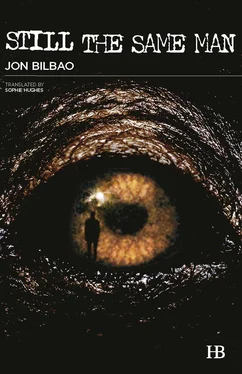And on top of this was the matter of Turing’s homosexuality. One might guess that the absolute surgical removal of this topic from Turing: Pragmatic Mathematics was owing to the revulsion, or unease, that it awoke in the professor. Joanes fantasized about how perturbed the professor would be by the image of Turing’s lifeless corpse — stretched out on the bed with his fingers interlocked atop his stomach, his pajamas stretched across his estrogen-produced breasts, his eyes closed peacefully, as if he were waiting for a prince to come and wake him with a gentle kiss on the lips.
Joanes’s readings led him to believe that he knew the professor better than ever, and certainly better than the rest of the students. He saw it as a personal triumph, as if no one else could have read the same books and arrived at similar conclusions. The knowledge that he had insights into what he considered to be the private opinions — and, as such, weak spots — of the professor made Joanes bolder in class. He no longer bowed his head when his eyes met the professor’s. He liked to think that the don had noticed what had happened and held him in special regard.
Joanes passed Numerical Analysis with the highest grade in his class. And in his subsequent years at the school, he never lost sight of the professor, regularly crossing paths with him in the School of Engineering. The professor responded to his greetings with dispassionate nods. He didn’t seem to remember who Joanes was.
There was only half a bottle of water left, which Joanes offered to the professor’s wife. She drank thirstily. Afterward, she dampened a handkerchief and patted her face and neck with it. Her husband then had a drink, after which she hastened to take back the bottle and kept it on her.
The professor asked Joanes what he was doing in Mexico, and Joanes gave him the short version of events.
“So why aren’t you with your family?”
Joanes explained that his wife and daughter had gone on ahead and were already in Valladolid. The professor wanted to know the reason why he’d stayed behind, so Joanes explained the episode with the monkey.
“It was wearing a collar. I suppose it must have escaped from somewhere. There are a bunch of theme parks in the area. It’s possible at least one of them keeps monkeys. It was wearing a bracelet, too. A cheap little accessory, with blue and pink beads.”
“How curious,” remarked the professor.
In the rearview mirror, Joanes kept an eye on the woman. Most of the time, she had her eyes closed.
“Are you feeling all right?” he asked her.
She stared at him for a few seconds then said, “Are we very far from the place?”
“I don’t know exactly. I don’t think so.”
She mumbled something unintelligible and closed her eyes again.
The professor looked out at the landscape, an anxious look on his face. Joanes told himself that it would be better to save any questions for later.
The professor had the road map laid out on his lap, and he kept a watchful eye on the road signs. It was past midday when he tutted and drew the map right up to his nose to study it closer.
“Is there a problem?” asked Joanes.
“I’ve just seen a sign saying how many miles it is to Valladolid.”
“A nd?”
“The number of miles was higher than it said on the last sign.”
“Are we lost?” asked the wife.
“No,” answered Joanes and the professor in unison.
Though they couldn’t be certain. Every crossroad and fork was a chaos of vehicles either joining or exiting the main stream of traffic, to the extent that you couldn’t even tell which was the main road. Not long after, they passed a sign that didn’t even mention Valladolid. The professor went back to studying the map.
“I think we’re somewhere around here,” he said, pointing to an area north of the highway that they should have stayed on and which, to all appearances, they’d strayed from without realizing.
“How far from Valladolid?” asked Joanes.
“I don’t know. This map covers the whole of Mexico. You should have gotten a detailed one of just the state.”
He went back to look at the map again and said that they might be forty miles from Valladolid. Maybe more.
The three of them looked at their watches, then at the sky, which was still clear. Joanes tried to appear calm, although he felt far from it.
He wasn’t just worried about how close the hurricane was. He had hoped to have received a call by now from the man who was, up until the day before, an almost sure client. He hadn’t told Joanes the exact time the meeting with whoever it was had been scheduled for, but in Spain, seven hours ahead, it was already evening.
He told himself to think positively. Perhaps the meeting had been postponed until the following day. For as long as Joanes had known him, his client had never given him any reason to mistrust him. If he’d said that he’d call, he’d call. Then Joanes would have the chance to explain the markdowns — minimal ones, but markdowns all the same — that he’d applied to his offer.
To top it all off, his phone was nearly out of battery. The night before, busy going over the hotel deal, he’d forgotten to charge it. By the time he realized the next morning, he’d already set off, but he figured that the remaining battery would last him for the rest of the journey. He hadn’t counted on the terrible traffic, or on getting lost.
In the run-up to his trip to Mexico, Joanes had rented a satellite telephone. With the hotel contract still in the air, he wanted to be reachable anytime and anyplace. The product description had promised it was designed “for the toughest customer, in the toughest conditions.” These words were accompanied by a photo of a soldier in desert gear standing in front of a horizon of sand dunes, talking on the very same phone. But with the battery dead, it wasn’t much use to anyone. He regretted now not having asked for the whole accessory pack, which included a spare battery, a charger that connected to the car lighter, and a portable solar panel that would allow the phone to charge without any electricity at all.
“What are we going to do?” asked the professor’s wife.
Joanes said that they’d keep going until they came to a sign that would help them get their bearings. But not long after, they found themselves stuck on a stretch of road with a single lane in each direction, both bumper to bumper.
“Now what?” the professor wanted to know.
Joanes looked at his watch again. Then he got out of the car to see how far the backup went on for. A U-turn wasn’t possible at the moment, nor was it a particularly appealing option. He made signs to try to catch the attention of the driver in the car that had come to a standstill next to them in the opposite lane. The man was Mexican, and he was eating a slice of pineapple. There was a woman in the passenger seat and four young children in the back. Tied to the car roof was a mattress.
“Which way to Valladolid?”
The Mexican man pulled a puzzled face. He looked ahead of him and then turned back, peering between his children’s heads, as if he didn’t know where he was, either.
“That way,” he said, pointing ahead with his slice of pineapple, in the exact opposite direction from the one Joanes’s car was facing.
“Is it far?”
“I don’t think so.”
Joanes waited for the man to go on, but he didn’t elaborate. He got back into the car.
“Shall we turn around?” asked the professor.
“It’s impossible here. We’ll have to go on a bit further.”
Twenty minutes later, they’d only advanced about half a mile. Once again, Joanes asked which way it was to Valladolid. Another Mexican man pointed in the opposite direction as the last guy.
Читать дальше












